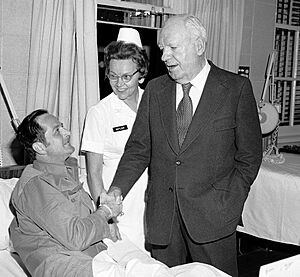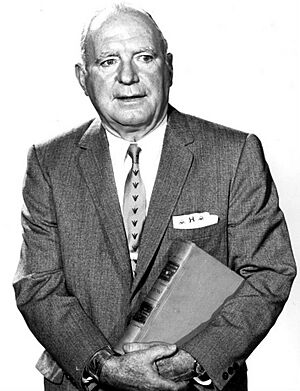Pat O'Brien (actor) facts for kids
Quick facts for kids
Pat O'Brien
|
|
|---|---|
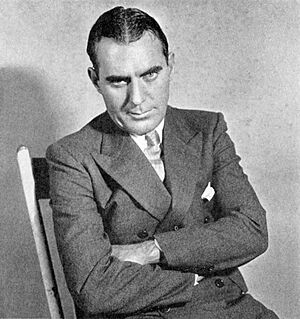
Pat O'Brien in 1931
|
|
| Born |
William Joseph Patrick O'Brien
November 11, 1899 Milwaukee, Wisconsin, U.S.
|
| Died | October 15, 1983 (aged 83) Santa Monica, California, U.S.
|
| Occupation | Actor |
| Years active | 1925–1983 |
| Spouse(s) |
Eloise Taylor
(m. 1931) |
| Children | 4 |
William Joseph Patrick O'Brien (born November 11, 1899 – died October 15, 1983) was a famous American actor. He appeared in over 100 movies! Because his family came from Ireland, he often played Irish characters. People even called him "Hollywood's Irishman in Residence."
Pat O'Brien was one of the most popular actors in the 1930s and 1940s. He played many different roles, like priests, police officers, soldiers, pilots, and reporters. Some of his most famous movies include Knute Rockne, All American (1940), Angels with Dirty Faces (1938), and Some Like It Hot (1959). He often acted alongside his good friend, the Hollywood star James Cagney. Besides movies, O'Brien also performed on stage and on television.
Contents
Growing Up in Milwaukee
Pat O'Brien was born in 1899 in Milwaukee, Wisconsin. His family was Catholic and all four of his grandparents had moved to America from Ireland. The O'Briens were originally from a place called County Cork in Ireland. His grandfather, Patrick O'Brien, who he was named after, was an architect. His mother's parents, the McGoverns, came from County Galway in western Ireland.
As a child, Pat O'Brien was an altar boy at Gesu Church in Milwaukee. He went to Marquette Academy with his lifelong friend, Spencer Tracy, who also became a famous actor.
During World War I, O'Brien and Tracy joined the United States Navy. They both trained at the Great Lakes Naval Training Center. However, the war ended before they finished their training, so they never went to sea.
Another famous person, Jack Benny, was also at the Great Lakes Naval Training Center at the same time. One evening, Jack Benny was playing the violin at a show, but the audience started booing him. Pat O'Brien walked onto the stage and quietly told Benny to stop playing and just talk to the audience. Benny followed his advice and made some jokes that made everyone laugh. In this way, Pat O'Brien helped Jack Benny start his career as a comedian!
After the war, O'Brien finished high school and then went to Marquette University. While still in college, he decided he wanted to be an actor. He and Spencer Tracy moved to New York City. They both studied acting at the American Academy of Dramatic Arts. The two friends shared a small apartment and began their acting careers on the stage.
Starting His Acting Career
Pat O'Brien spent ten years acting in plays on Broadway and in the New York City area.
His first movie was a short film called The Nightingale in 1930. His first main role was as a quick-thinking reporter named Hildy Johnson in the 1931 movie The Front Page. This film was so important that in 2010, it was chosen to be kept in the Library of Congress's National Film Registry because it was "culturally, historically, or aesthetically significant."
He starred in other movies like Personal Maid (1931) and Consolation Marriage (1932). He also acted with a young Bette Davis in Hell's House (1932). O'Brien continued to get lead roles, moving between different film studios. He played a brave pilot in Air Mail (1932), directed by John Ford.
Becoming a Warner Bros. Star
Pat O'Brien's first movie with Warner Bros. was Bureau of Missing Persons (1933). Soon after, Warner Bros. signed him to a long-term contract. He worked for this studio until 1940.
He acted in movies like College Coach (1933) and I've Got Your Number (1934).
Here Comes the Navy (1934) was the first movie where O'Brien acted with James Cagney. They had met in 1926 and were friends for almost 60 years! After O'Brien passed away, Cagney called him his "dearest friend." O'Brien played the main character, a boxer, in The Personality Kid (1934).
Cagney and O'Brien worked together again in Devil Dogs of the Air (1935). O'Brien also starred in Oil for the Lamps of China (1935), which he said was one of his favorite movies.
They were together again in The Irish in Us (1935) and then in Howard Hawks' movie Ceiling Zero (1935). Cagney later had a disagreement with Warner Bros. because O'Brien's name was listed before his in the movie credits.
In 1935, O'Brien said about working with Cagney: "Jimmy's grand to work with. You couldn't ask for a better partner. But there's a limit to all that. I think one picture a year with Jimmy would be fine. But as it is I've been with him in every uniform – the army, the navy, the police, the marines, the air corps – and it's always a case of me falling for his girl or him falling for mine. It gets tiresome... I don't just want to be a fast-talking Charlie all my life."
Warner Bros. gave him more starring roles, such as I Married a Doctor (1936), Public Enemy's Wife (1936), and China Clipper (1936). He was also in The Great O'Malley (1937) and Slim (1937) with Henry Fonda. He played a captain in San Quentin (1937) with Humphrey Bogart.
O'Brien and Cagney teamed up again for Boy Meets Girl (1938). One of O'Brien's most famous roles was as a former street kid who becomes a priest in Angels with Dirty Faces (1938), again with James Cagney.
He also starred in Indianapolis Speedway (1939). He then made Slightly Honorable (1939) for another studio.
Back at Warner Bros., he was with Cagney again in The Fighting 69th (1940). He also made Castle on the Hudson (1940) and 'Til We Meet Again (1940).
O'Brien then got his most well-known role: playing the famous University of Notre Dame football coach Knute Rockne in Knute Rockne, All American (1940). In the movie, he gives a famous speech to "win just one for the Gipper," talking about a football player named George Gipp. A young Ronald Reagan played Gipp in the film. Reagan later used this famous line when he ran for president in 1980.
At this time, O'Brien was at the peak of his career. He was even considered for the lead role in the movie Sergeant York. However, Pat O'Brien left Warner Bros. in July 1940.
After Warner Bros.
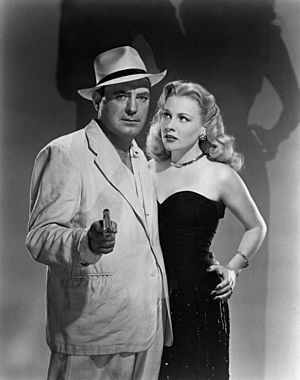
After leaving Warner Bros. in 1940, O'Brien signed a contract with 20th Century Fox. He then signed with Columbia Pictures to make two movies a year. He appeared in Escape to Glory (1940) and Two Yanks in Trinidad (1942).
Soon, he signed a contract with RKO studio. He played many roles as authority figures or military men, such as in The Navy Comes Through (1942) and Bombardier (1943). The Iron Major (1943) was another movie where O'Brien played a famous coach, hoping to repeat the success of Knute Rockne.
He also supported Deanna Durbin in His Butler's Sister (1943). With his agent, Phil Ryan, O'Brien even started his own movie company called Teneen Productions. They made a film called Secret Command (1944).
In 1946, he starred in a successful suspense film called Crack-Up. He was also in Riffraff (1947) and another movie about a real person, Fighting Father Dunne (1948).
During the 1930s and 1940s, while working in Hollywood, O'Brien also appeared on the radio. In 1946, he worked with singer Kate Smith on a popular radio show called Viva America.
Later Career and Television
By the early 1950s, Pat O'Brien's movie career slowed down. However, he found a lot of work in television. His good friend, Spencer Tracy, even tried to get him roles in his own movies, like The People Against O'Hara (1951) and The Last Hurrah (1958).
O'Brien still had lead roles in films like Okinawa (1952). In 1959, he appeared in a supporting role in one of his most famous movies, Some Like It Hot. He played a police detective alongside George Raft, and the movie also starred Marilyn Monroe, Jack Lemmon, and Tony Curtis.
In his later years, O'Brien worked a lot on television. He played priests in several episodes of the show Crossroads. He also appeared in The Virginian. From 1960 to 1961, O'Brien starred as James Harrigan, Sr. in a TV show called Harrigan and Son.
Pat O'Brien often appeared on TV as himself, including on The Ed Sullivan Show and The Tonight Show. In 1957, a show called This Is Your Life featured his life and career. He was also a mystery guest on the game show What's My Line?. His final acting role was in a 1982 episode of Happy Days.
In 1970, Pat O'Brien spoke the words to the Star Spangled Banner at the start of Super Bowl IV. He was asked to do this because of his famous role as Knute Rockne.
He had a small role as Burt Reynolds' father in the 1978 comedy film The End.
Later in his life, O'Brien said that he had three "great" movie roles: Knute Rockne, Hildy Johnson in The Front Page, and Father Duffy in The Fighting 69th.
From the 1960s to the early 1980s, O'Brien often traveled around the United States performing in one-man shows and plays. He also performed in nightclubs. Near the end of his life, he toured in a stage play called On Golden Pond, which he thought was the "best play" he had ever read.
The "Irish Mafia" Club
In the late 1930s, Pat O'Brien and a group of his actor friends started meeting up to talk and share stories. A Hollywood writer called them the "Irish Mafia," but they preferred to call their group the "Boys Club."
The first members of the club were Pat O'Brien, James Cagney, Spencer Tracy, Allen Jenkins, and Frank McHugh. All of them were Irish-American. Later, other actors joined, including Lynne Overman, George Brent, James Dunn, Louis Calhern, William Gargan, Paul Kelly, Regis Toomey, Brian Donlevy, Ralph Bellamy, Lloyd Nolan, Frank Morgan, James Gleason, and Bert Lahr.
These actors gathered to socialize, but they also sometimes talked about ideas for their movies. By the mid-1940s, the group started to break up as members moved away or passed away. Some of the remaining members stayed in touch by phone and occasional meetings.
Pat O'Brien's Family Life
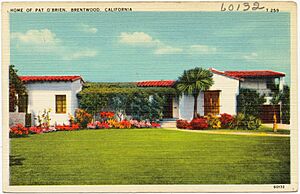
Pat O'Brien and his wife, Eloise, had four children: Mavourneen, Sean, Terry, and Brigid. Three of their children were adopted. Their youngest child, Brigid O'Brien (1946-2016), was their biological daughter. Eloise O'Brien sometimes acted on stage with her husband.
People who knew Pat O'Brien personally said he loved telling stories, jokes, and hosting parties. The famous comedian Bob Hope remembered him as a great storyteller. Another friend said he was always "the life, and I mean the lively life, of the party." In February 1969, he traveled to Vietnam as part of a U.S. tour.
Pat O'Brien passed away on October 15, 1983, at the age of 83. He died from a heart attack after a small surgery. President Ronald Reagan released a statement saying he was sad about his old friend's death. The president had called O'Brien in the hospital just a few days before he died.
Images for kids
-
Promotional still for Ceiling Zero (1936), featuring Pat O'Brien, Martha Tibbetts, James Cagney, June Travis and Stuart Erwin
Filmography
| Year | Title | Role | Notes |
|---|---|---|---|
| 1930 | The Nightingale | Short | |
| 1931 | Honor Among Lovers | Conroy | |
| 1931 | The Front Page | Hildy Johnson | |
| 1931 | Personal Maid | Peter Shea | |
| 1931 | Consolation Marriage | Steve Porter | |
| 1931 | Flying High | Sport Wardell | |
| 1932 | Hell's House | Matt Kelly | |
| 1932 | Scandal for Sale | Waddell | |
| 1932 | American Madness | Matt Brown | |
| 1932 | Flaming Gold | Ben Lear | |
| 1932 | Air Mail | Duke Talbot | |
| 1933 | Laughter in Hell | Barney Slaney | |
| 1933 | Bureau of Missing Persons | Butch Saunders | |
| 1933 | College Coach | Coach Gore | |
| 1934 | I've Got Your Number | Terry Riley | |
| 1934 | Gambling Lady | Charlie Lang | |
| 1934 | Twenty Million Sweethearts | Rush Blake | |
| 1934 | The Personality Kid | Ritzy McCarty | |
| 1934 | Here Comes the Navy | Biff Martin | |
| 1935 | Devil Dogs of the Air | Lieutenant Bill Brannigan | |
| 1935 | Oil for the Lamps of China | Stephen Chase | |
| 1935 | The Irish in Us | Pat O'Hara | |
| 1936 | Ceiling Zero | Jake Lee | |
| 1936 | I Married a Doctor | Dr. William P. Kennicott | |
| 1936 | Public Enemy's Wife | Lee Laird | |
| 1936 | China Clipper | Dave Logan | |
| 1937 | The Great O'Malley | James Aloysius O'Malley | |
| 1937 | San Quentin | Capt. Stephen Jameson | |
| 1937 | Slim | Red Blayd | |
| 1938 | Women Are Like That | Bill Landin | |
| 1938 | Cowboy from Brooklyn | Ray Chadwick | |
| 1938 | Boy Meets Girl | J. C. Benson | |
| 1938 | Angels with Dirty Faces | Jerry Connolly | |
| 1939 | Off the Record | Thomas Elliott | |
| 1939 | Indianapolis Speedway | Joe Greer | |
| 1940 | The Fighting 69th | Father Francis Duffy | |
| 1940 | Castle on the Hudson | Warden Long | |
| 1940 | 'Til We Meet Again | Steve Burke | |
| 1940 | Torrid Zone | Steve Case | |
| 1940 | Escape to Glory | Mike Farrough | |
| 1940 | Knute Rockne, All American | Knute Rockne | |
| 1942 | Broadway | Dan McCorn | |
| 1942 | Two Yanks in Trinidad | Tim Reardon | |
| 1942 | Flight Lieutenant | Sam Doyle | |
| 1942 | The Navy Comes Through | Michael Mallory | |
| 1943 | Bombardier | Major Chick Davis | |
| 1943 | The Iron Major | Frank Cavanaugh | |
| 1943 | His Butler's Sister | Martin Murphy | |
| 1944 | Marine Raiders | Major Steve Lockhard | |
| 1944 | Secret Command | Sam Gallagher | |
| 1945 | Having Wonderful Crime | Michael J. Malone | |
| 1946 | Perilous Holiday | Patrick Nevil | |
| 1946 | Crack-Up | George Steele | |
| 1947 | Riffraff | Dan Hammer | |
| 1948 | Fighting Father Dunne | Father Peter J. Dunne | |
| 1948 | The Boy with Green Hair | Gramp Frye | |
| 1949 | A Dangerous Profession | Joe Farley | |
| 1950 | Johnny One-Eye | Martin Martin | |
| 1950 | The Fireball | Father O'Hara | |
| 1951 | The People Against O'Hara | Vince Ricks | |
| 1952 | Okinawa | Lt. Commander Hale | |
| 1954 | Jubilee Trail | Ernest 'Texas' Conway | |
| 1954 | Ring of Fear | Frank Wallace | |
| 1956 | Inside Detroit | Gus Linden | |
| 1957 | Kill Me Tomorrow | Bart Crosbie | |
| 1958 | The Last Hurrah | John Gorman | |
| 1959 | Some Like It Hot | Detective Mulligan | |
| 1962 | The Road to Hong Kong | Chinese Restaurateur | Uncredited |
| 1965 | Town Tamer | Judge Murcott | |
| 1969 | The Over-the-Hill Gang | Captain Oren Hayes | TV movie |
| 1970 | The Phynx | Pat O'Brien | |
| 1975 | The Sky's the Limit | Abner Therman | |
| 1977 | Billy Jack Goes to Washington | Vice President | |
| 1978 | The End | Ben Lawson | |
| 1981 | Ragtime | Delphin |
Short Films:
- A Dream Comes True (1935)
- A Trip Thru a Hollywood Studio (1935)
- Swingtime in the Movies (1938)
- Out Where the Stars Begin (1938)
- Screen Snapshots: Famous Fathers and Sons (1946)
- Screen Snapshots: Hollywood's Happy Homes (1949)
- Screen Snapshots: Motion Picture Mothers, Inc. (1949)
- Screen Snapshots: Hopalong in Hoppy Land (1951)
- Screen Snapshots: Memorial to Al Jolson (1952)
- Screen Snapshots: Hollywood Mothers and Fathers (1955)
- Screen Snapshots: Hollywood Beauty (1955)
Television Appearances
| Year | Program | Episode | Role | |
|---|---|---|---|---|
| 1954 | Place the Face | March 11, 1954 | Himself | |
| 1955–1957 | Crossroads | (three episodes) | Father Patrick O'Neil / Father Edward Sullivan / Father Jim / Father Edmund Boyle | |
| 1955 | Science Fiction Theatre | Are We Invaded? | Dr. Arnold | |
| 1956 | Sneak Preview | The Way Back | ||
| 1957 | What's My Line? | October 13, 1957 | Mystery Guest | |
| 1959 | Walt Disney Presents | I Captured the King of the Leprechauns | Himself | |
| 1960 | Joyful Hour | Host | ||
| 1960–1961 | Harrigan and Son | James Harrigan Sr. | ||
| 1963 | Going My Way | The Boss of the Ward | Frank McCaffey | |
| 1966 | Hazel | Uncle Jerome Van Meter | ||
| 1969 | The Over-the-Hill Gang | Capt. Oren Hayes | ||
| 1972 | Welcome Home, Johnny Bristol | Sgt. McGll | ||
| 1972 | Adventures of Nick Carter | Hallelujah Harry | ||
| 1973 | McCloud | Mac Ferguson | ||
| 1976 | Kiss Me, Kill Me | Jimmy, morgue attendant | ||
| 1980 | Scout's Honor | Mr. Caboose | ||
| 1981 | WKRP In Cincinnati | Col. H. Buchanan | ||
| 1980–1982 | Happy Days | Uncle Joe (final appearance) |
Radio Appearances
| Year | Program | Episode | Co Star | |
|---|---|---|---|---|
| 1936 | Lux Radio Theatre | Alias Jimmy Valentine | w/ Madge Evans | |
| 1939 | Lux Radio Theatre | Angels With Dirty Faces | w/ James Cagney | |
| 1940 | Lux Radio Theatre | Knute Rockne, All American | w/ Ronald Reagan & Fay Wray | |
| 1942 | Lux Radio Theatre | The Fighting 69th | w/ Robert Preston | |
| 1943 | Lux Radio Theatre | The Navy Comes Through | w/ George Murphy & Ruth Hussey | |
| 1943 | Lux Radio Theatre | The Navy Comes Through | w/ Ruth Warrick & Chester Morris | |
| 1944 | Lux Radio Theatre | His Butler's Sister | w/ Deanna Durbin | |
| 1945 | Lux Radio Theatre | Grissly's Millions | w/ Lynn Bari | |
| 1946 | Lux Radio Theatre | Crack-Up | w/ Lynn Bari |
See also
 In Spanish: Pat O'Brien (actor) para niños
In Spanish: Pat O'Brien (actor) para niños



